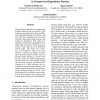Free Online Productivity Tools
i2Speak
i2Symbol
i2OCR
iTex2Img
iWeb2Print
iWeb2Shot
i2Type
iPdf2Split
iPdf2Merge
i2Bopomofo
i2Arabic
i2Style
i2Image
i2PDF
iLatex2Rtf
Sci2ools
NAACL
2010
2010
From Baby Steps to Leapfrog: How "Less is More" in Unsupervised Dependency Parsing
We present three approaches for unsupervised grammar induction that are sensitive to data complexity and apply them to Klein and Manning's Dependency Model with Valence. The first, Baby Steps, bootstraps itself via iterated learning of increasingly longer sentences and requires no initialization. This method substantially exceeds Klein and Manning's published scores and achieves 39.4% accuracy on Section 23 (all sentences) of the Wall Street Journal corpus. The second, Less is More, uses a low-complexity subset of the available data: sentences up to length 15. Focusing on fewer but simpler examples trades off quantity against ambiguity; it attains 44.1% accuracy, using the standard linguisticallyinformed prior and batch training, beating state-of-the-art. Leapfrog, our third heuristic, combines Less is More with Baby Steps by mixing their models of shorter sentences, then rapidly ramping up exposure to the full training set, driving up accuracy to 45.0%. These trends general...
Baby Steps | Computational Linguistics | Data Complexity | NAACL 2010 | Unsupervised Grammar Induction |
| Added | 14 Feb 2011 |
| Updated | 14 Feb 2011 |
| Type | Journal |
| Year | 2010 |
| Where | NAACL |
| Authors | Valentin I. Spitkovsky, Hiyan Alshawi, Daniel Jurafsky |
Comments (0)

